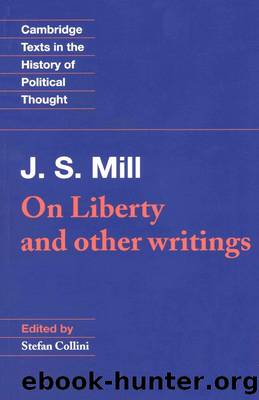J. S. Mill: 'On Liberty' and Other Writings (Cambridge Texts in the History of Political Thought) by John Stuart Mill

Author:John Stuart Mill [Mill, John Stuart]
Language: eng
Format: azw3, epub
Tags: On Liberty
Publisher: Cambridge University Press
Published: 1989-08-25T00:00:00+00:00
CHAPTER 2
It will be well to commence the detailed discussion of the subject by the particular branch of it to which the course of our observations has led us: the conditions which the laws of this and all other countries annex to the marriage contract. Marriage being the destination appointed by society for women, the prospect they are brought up to, and the object which it is intended should be sought by all of them, except those who are too little attractive to be chosen by any man as his companion; one might have supposed that everything would have been done to make this condition as eligible to them as possible, that they might have no cause to regret being denied the option of any other. Society, however, both in this, and, at first, in all other cases, has preferred to attain its object by foul rather than fair means: but this is the only case in which it has substantially persisted in them even to the present day. Originally women were taken by force, or regularly sold by their father to the husband. Until a late period in European history, the father had the power to dispose of his daughter in marriage at his own will and pleasure, without any regard to hers. The Church, indeed, was so far faithful to a better morality as to require a formal âyesâ from the woman at the marriage ceremony; but there was nothing to shew that the consent was other than compulsory; and it was practically impossible for the girl to refuse compliance if the father persevered, except perhaps when she might obtain the protection of religion by a determined resolution to take monastic vows. After marriage, the man had anciently (but this was anterior to Christianity) the power of life and death over his wife. She could invoke no law against him; he was her sole tribunal and law. For a long time he could repudiate her, but she had no corresponding power in regard to him. By the old laws of England, the husband was called the lord of the wife; he was literally regarded as her sovereign, inasmuch that the murder of a man by his wife was called treason (petty as distinguished from high treason), and was more cruelly avenged than was usually the case with high treason, for the penalty was burning to death. Because these various enormities have fallen into disuse (for most of them were never formally abolished, or not until they had long ceased to be practised) men suppose that all is now as it should be in regard to the marriage contract; and we are continually told that civilisation and Christianity have restored to the woman her just rights. Meanwhile the wife is the actual bondservant of her husband: no less so, as far as legal obligation goes, than slaves commonly so called. She vows a lifelong obedience to him at the altar, and is held to it all through her life by law.
Download
J. S. Mill: 'On Liberty' and Other Writings (Cambridge Texts in the History of Political Thought) by John Stuart Mill.epub
This site does not store any files on its server. We only index and link to content provided by other sites. Please contact the content providers to delete copyright contents if any and email us, we'll remove relevant links or contents immediately.
| Anthropology | Archaeology |
| Philosophy | Politics & Government |
| Social Sciences | Sociology |
| Women's Studies |
Cecilia; Or, Memoirs of an Heiress — Volume 1 by Fanny Burney(31322)
Cecilia; Or, Memoirs of an Heiress — Volume 3 by Fanny Burney(30928)
Cecilia; Or, Memoirs of an Heiress — Volume 2 by Fanny Burney(30885)
The Great Music City by Andrea Baker(21166)
We're Going to Need More Wine by Gabrielle Union(18064)
Bombshells: Glamour Girls of a Lifetime by Sullivan Steve(13100)
Pimp by Iceberg Slim(12922)
All the Missing Girls by Megan Miranda(12739)
Fifty Shades Freed by E L James(12443)
Norse Mythology by Gaiman Neil(11873)
Talking to Strangers by Malcolm Gladwell(11861)
Crazy Rich Asians by Kevin Kwan(8340)
Mindhunter: Inside the FBI's Elite Serial Crime Unit by John E. Douglas & Mark Olshaker(7827)
The Lost Art of Listening by Michael P. Nichols(6462)
Enlightenment Now: The Case for Reason, Science, Humanism, and Progress by Steven Pinker(6402)
Bad Blood by John Carreyrou(5761)
The Four Agreements by Don Miguel Ruiz(5502)
Weapons of Math Destruction by Cathy O'Neil(5029)
We Need to Talk by Celeste Headlee(4861)
